Politics
Nigeria Customs Service Enhances Operations Through Strategic Alliances
Published
4 months agoon
By
Ekwutos Blog
…Signs Landmark Customs Mutual Assistance Agreements (CMAAs) with Indian Customs, others
As global trade grows increasingly complex, the need for strategic partnerships has become critical. From aligning with international frameworks to fostering collaborations with local and regional entities, the Nigeria Customs Service (NCS) has continually evolved to meet the demands of a dynamic trade environment. These partnerships are essential not only for combating smuggling and illicit trade but also for ensuring the seamless flow of legitimate trade that drives economic growth.
Over the years, the NCS has embraced various international and regional frameworks, signed Memorandums of Understanding (MoUs), and deepened cooperation with customs administrations worldwide. These efforts underscore the recognition that customs operations cannot function in isolation in an interconnected global economy. From adopting the World Trade Organisation (WTO) Trade Facilitation Agreement to implementing the World Customs Organisation (WCO) SAFE Framework of Standards, the NCS has demonstrated a commitment to efficiency, security, and transparency.
The WTO Trade Facilitation Agreement and Its Impact on NCS
The WTO Trade Facilitation Agreement (TFA), ratified in 2017, is a landmark accord aimed at simplifying and modernising global trade procedures. For Nigeria, the TFA provides a framework for reducing trade costs, eliminating unnecessary barriers, and improving the efficiency of customs operations. The NCS has been at the forefront of implementing TFA provisions to enhance trade facilitation.
The agreement emphasises transparency, prompting the NCS to publish import and export procedures online, making them accessible to stakeholders. Furthermore, the adoption of pre-arrival processing, Time Release Studies, Advance Ruling Systems, Authorised Economic Operator (AEO) programmes, and risk-based management systems aligns with the TFA’s focus on efficiency. These measures are set to reduce clearance times at Nigeria’s ports, boosting the country’s competitiveness in global trade.
By embracing the TFA, the NCS has not only facilitated legitimate trade but also improved compliance rates among importers and exporters. This balance between trade facilitation and regulatory enforcement reflects the Service’s commitment to fostering an environment conducive to economic growth.
The WCO SAFE Framework of Standards: Strengthening Global Supply Chains
The WCO SAFE Framework of Standards is another critical pillar in the NCS’s operational strategy. Designed to secure and facilitate global trade, the framework promotes cooperation between customs administrations and the private sector while ensuring the safety and security of supply chains.
For the NCS, implementing the WCO SAFE Framework has been transformative. The Service has adopted risk management tools to identify high-risk consignments, streamlining the inspection process for low-risk goods. This has resulted in faster clearance times and reduced congestion at ports.
In addition, the Authorised Economic Operator (AEO) programme, a key component of the framework, has incentivised compliance by offering trusted traders benefits such as expedited processing and reduced inspections.
By aligning with the WCO SAFE Framework, the NCS has enhanced its capacity to combat smuggling, counterfeiting, and other illicit activities, ensuring that Nigeria’s borders remain secure while facilitating legitimate trade.
Customs-to-Customs Cooperation: A Global Perspective
International cooperation is vital for the NCS to effectively address cross-border challenges. Customs-to-customs collaboration facilitates the exchange of information, intelligence, and best practices, enabling the NCS to tackle complex issues such as smuggling and tax evasion.
On 18 July 2024, Comptroller-General of Customs, Bashir Adewale Adeniyi, took a significant step in strengthening global partnerships by participating in a bilateral meeting with U.S. Customs and Border Protection (CBP) in Washington, D.C. The meeting focused on reviving the over-decade-old Customs Mutual Assistance Agreement (CMAA) to enhance service delivery through global collaborations and data-driven decision-making to improve national security and combat cross-border crimes.
The CGC highlighted the NCS’s ongoing efforts to address challenges such as drug trafficking, arms smuggling, and money laundering, while ensuring national security. He noted that reviving the CMAA would bolster the NCS’s capacity to protect Nigeria’s borders and enhance service delivery.
On Wednesday, 8 May 2024, Comptroller-General of Customs (CGC) Adewale Adeniyi led some of his management team in Shenzhen, where he signed a bilateral affiliation with China, which, according to him, will boost the two countries’ import-export operations and favour the businesses of MSMEs in Nigeria.
The CGC appreciated the Vice Minister of the General Administration of Customs of the People’s Republic of China, Wang Lingjun, for showing interest in signing MoU with the NCS. He also applauded the recent exponential rise in the development of e-commerce, adding, “We know a lot of Nigerian companies and SMEs take advantage of the opportunities aided through e-commerce.”
CGC Adeniyi expressed optimism that the NCS-GACC Memorandum of Understanding will serve as a critical component of cooperative security and trade relationship between the two nation’s Customs agencies, reiterating that “The relationship will create a cooperative mechanism for NCS and the GACC to collaborate on supply chain security standards and enhance the economic stability of both nations.”
“These are some of the many reasons why Nigeria Customs Service pays attention to what is happening in China. As you have said, China is making the biggest trade in Nigeria, and the basic context of International Trade is ‘your export is our import’. I appreciate the numbers that you gain in Nigeria. But it is also common knowledge that those numbers sometimes must take account of the large volume of informal trade that exists between us.” CGC Adeniyi said.
Mr Wang Lingjun of the General Administration of Customs, who represented Vice Minister Sun Yuning, and signed the MoU on behalf of the People’s Republic of China, expressed satisfaction over CGC Adeniyi’s vision that the affiliation between two agencies will serve as a mechanism for creating opportunities that Nigeria and China share on a wide range of economic issues and trade facilitation.
In 2023 alone, the NCS successfully intercepted over 5,000 illegal firearms and large quantities of counterfeit pharmaceuticals. Such achievements underscore the importance of customs-to-customs partnerships, which also include capacity-building initiatives and technical assistance to modernise technologies and practices.
Customs-to-Business Partnerships: Enhancing Trade Facilitation
In addition to international cooperation, the NCS has prioritised customs-to-business partnerships to foster trust and collaboration with the private sector. These partnerships are crucial for balancing regulatory enforcement to facilitate legitimate trade.
The Authorised Economic Operator (AEO) programme is a prime example of customs-to-business collaboration. The programme has encouraged greater transparency and adherence to customs regulations by granting benefits to compliant traders. Additionally, the NCS has engaged with stakeholders through public forums and consultations to address concerns and improve service delivery.
On September 2, 2024, the NCS rolled out the benefits of the AEO programme to select importers, exporters, SMEs, and logistics operators who demonstrated high levels of regulatory compliance.
In the first week of the rollout, one of the beneficiaries voluntarily disclosed an underpayment of duties due to the erroneous classification of a high-value item. The error, identified through a self-audit, was reported to the NCS without waiting for detection by customs officials. By taking immediate corrective action, the company avoided penalties while retaining the benefits of the AEO programme.
These partnerships have enhanced the efficiency of customs operations and bolstered Nigeria’s reputation as a trade-friendly nation. By working closely with businesses, the NCS has created an environment where compliance is rewarded, and trade facilitation is prioritised.
Regional Integration: AfCFTA’s Role in NCS Operations
The African Continental Free Trade Area (AfCFTA) represents a significant opportunity for Nigeria and the NCS. By removing trade barriers across Africa, AfCFTA aims to boost intra-African trade and foster economic integration.
To align with AfCFTA objectives, the NCS has facilitated Nigeria’s first shipment to Kenya, with Lucky Fibres, a subsidiary of the Tolaram Group, becoming one of the first companies to ship goods to Kenya under the African Continental Free Trade Area Agreement (AfCFTA).
During a visit to the Apapa Area Command on Wednesday, 30 October 2024, to ensure proper documentation and verification of the shipment, Olusegun Olutayo, Senior Trade Expert and Lead of Trade Enablement at the Nigeria AfCFTA Coordination Office, noted that the shipment from Nigeria to Kenya, specifically to the port of Mombasa, demonstrates the collaborative spirit of AfCFTA.
“It is not that we are doing it alone; I have already sent a message to the Secretariat in Ghana that there will be a shipment under AfCFTA to Kenya. I have also communicated with the AfCFTA implementation committee in Kenya. So this is the spirit we are building to ensure that we increase intra-African trade,” Olutayo noted.has taken proactive measures, such as implementing electronic single windows for trade, adopting geospatial intelligence tools, and enhancing border management systems. These initiatives are essential for ensuring Nigeria benefits fully from AfCFTA while safeguarding its revenue and security interests.
Recent MoUs: Strengthening Local and International Partnerships
The signing of MoUs with India on 17 November 2024 and NAFDAC underscores the NCS’s commitment to fostering strategic partnerships.
The CMAA with India establishes a framework for information sharing, joint investigations, and enforcement of customs laws. This partnership, which culminated from negotiations that began in 2016, is expected to streamline border clearance processes, reduce trade costs, and improve enforcement.
Key provisions include the accurate imposition of duties and taxes, verification processes, strengthened mechanisms to combat customs offences, and robust channels for information exchange.
Similarly, the recent MoU signed with NAFDAC at the side event during CGC’s Conference, held between 12 to 15 November 2024 in Abuja, highlights inter-agency collaboration in addressing public health and safety challenges. This partnership seeks to combat the importation of counterfeit pharmaceutical products, ensuring Nigerians have access to safe and high-quality medicines.
NAFDAC’s Director-General, Prof. Mojisola Adeyeye, emphasised that the agreement would strengthen efforts to safeguard public health by reinforcing regulatory frameworks and ensuring the integrity of food and drug products.
Conclusion: A Future Built on Collaboration
The Nigeria Customs Service’s strategic partnerships are a testament to its commitment to modernising customs operations, enhancing trade facilitation, and safeguarding Nigeria’s economy. From aligning with international frameworks like the WTO TFA and WCO SAFE Framework to forging partnerships with key stakeholders, the NCS has demonstrated a clear vision for the future.
Drawing from the recently concluded 2024 Comptroller General of Customs Conference, themed “Engaging Traditional and New Partners with a Purpose,” serves as a strategic platform for stakeholders to explore innovative ways to strengthen partnerships and address challenges within the global supply chain.
The conference emphasises how the Nigeria Customs Service (NCS) is leveraging collaborations with traditional and emerging partners to enhance its core revenue generation, trade facilitation, and compliance enforcement mandates. It examined how these partnerships can improve efficiency, promote seamless trade, and ensure compliance with global regulations, thereby bolstering Nigeria’s economic development.
With thought-provoking panels, keynote speeches, and interactive discussions, the event highlights the NCS’s commitment to modernisation and innovation. It underscores the pivotal role of partnerships in achieving operational excellence and driving Nigeria’s integration into the global economy.
You may like
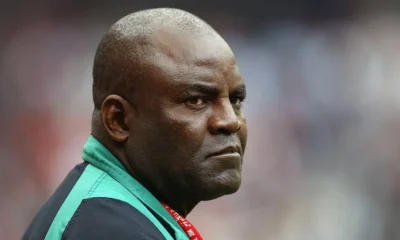

NFF denies owing late Christian Chukwu amid social media claims


VP KASHIM SHETTIMA APPLAUDS GOV ENO’S INVESTMENT IN HUMAN CAPITAL DEVT.


GOV. OTU HAILS TINUBU AS CONSTRUCTION OF LAGOS-CALABAR COASTAL HIGHWAY BEGINS IN CROSS RIVER


PRESIDENT TINUBU CONDEMNS LATEST ATTACK IN PLATEAU, CHARGES GOVERNOR MUTFWANG WITH RESOLVING UNDERLYING COMMUNAL ISSUES


Wike hails 95% implementation of FCT 2024 budget, unveils key projects


Benue Govt moves to block Peter Obi’s visit amid Alia’s defection rumours
Politics
VP KASHIM SHETTIMA APPLAUDS GOV ENO’S INVESTMENT IN HUMAN CAPITAL DEVT.
Published
4 hours agoon
April 14, 2025By
Ekwutos Blog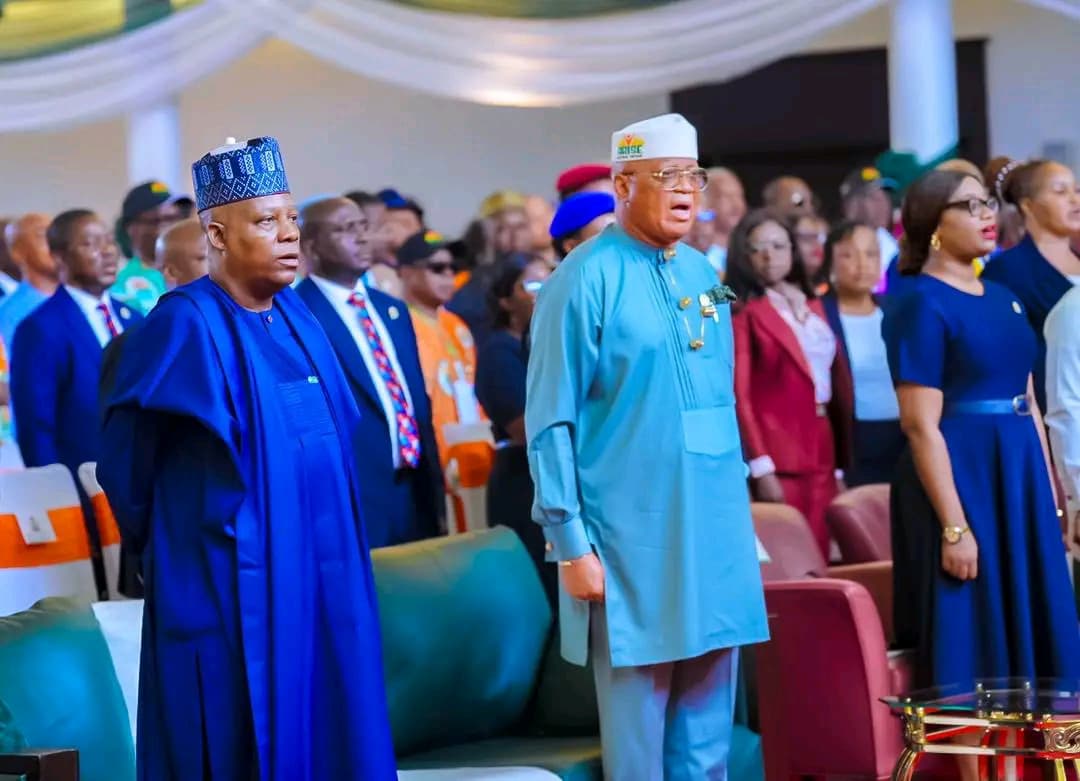
… says A’Ibom worthy of emulation
Vice President of Nigeria, Senator Kashim Shettima, has applauded the audacious investments in human capital development by Governor Umo Eno in Akwa Ibom State, saying he is worthy of emulation.
In his speech at the launch of the ARISE Human Capital Development Strategic Plan held at the Banquet Hall of Government House, Uyo, Vice President Shettima noted that investment in human capital development surpasses every form of investment.
“That is why I commend Akwa Ibom, not only for your outstanding performance, but for daring to dream bigger.
“With an under-five mortality rate of 80, compared to the national average of 110, and with only 3.5% of primary school-age children out of school—far below the national average of 25.6%—your state is not merely compliant with our national vision. You are ahead of the curve. And I assure you, the federal government stands ready to partner hand-in-hand with you.
“This is the Governor in whom the President has a lot of confidence.
“Let me therefore commend the Governor and his team for not only adopting the HCD framework but localising its operation and placing people at the center of public policies. This is leadership, this is what it means to govern with vision, foresight and commitment.”
The Vice President said the National Human Capital Development Programme, which has entered its second phase, is a solution re-engineered to meet the moment.
“At its core, HCD 2.0 is about integration and impact. It is built on the foundation of HCD 1.0, but goes further to incorporate cross-cutting themes. What has brought us together in Uyo—the launch of the ARISE Human Capital Development Strategy by His Excellency, Governor Umo Eno—is a template for each state of the federation. It’s a strategy that acknowledges that we can’t build an enduring castle without a solid foundation.
“What Akwa Ibom State has shown us here isn’t just progress, it is leadership. It has become the first state in the nation to localise the HCD vision in its truest form. While other states have a strategy tailored towards the state, Akwa Ibom has taken a step forward by adopting the strategies in all local government areas.
“We cannot solve what we do not measure. This is why we have launched the HCD Dashboard to monitor these indicators at both state and local levels with precision. We are deploying data not for reports, but for results.
“I urge every governor to learn from the example set by His Excellency, Governor Umo Eno. There’s no legacy that surpasses that of building our people. There’s no monument that would outlive the legacies of health, education, and opportunity,” he said.
Earlier in his remark, Governor Umo Eno saluted the Vice President for the great work done in putting together the building blocks of the ARISE Human Capital Development and Local Government HCD Implementation Roadmap and Strategic Plan, and also leading frontally towards its implementation and delivery.
He also appreciated President Bola Ahmed Tinubu for making Human Capital Development a major focal area of his Renewed Hope Agenda, of which, according to him, Akwa Ibom State is a beneficiary.
The Governor said the Human Capital Development Plan is also designed to expansively provide key human-centric projects such as healthcare services, which the State is currently executing through investments in the construction and equipping of primary healthcare centers, provision of quality education at both the primary and secondary levels, empowerment of people, and equipping them with the requisite skills, knowledge and equipment they need to succeed in a rapidly changing world.
He enumerated different efforts of his administration at human capital development to include: establishment of the Ibom Leadership and Entrepreneurial Development Centre (IBOM-LED), which has trained over 4,000 people with start-up grants ranging from N5,000 to N750,000; the Dakkada Skills Acquisition Centre, DASAC, where over 400 trainees recently graduated in various areas of skill sets.
Also in the list included: 16 youths in Toulouse, France for training as pilots with Airbus; 21 engineers who recently came back from training with Ethiopian Airlines and would soon be absorbed by Ibom Air; empowerment of businesses, traders, and farmers with grants worth over N4 billion through Town Square Empowerment Meetings and support for Small and Medium Scale Enterprises (SMEs); and many others.
He noted that his people-first policy, which is encapsulated in the government’s ARISE Agenda, aligns with that of the federal government, and he would do all possible to ensure the HCD programme meets its set target.
— EKERETE UDOH
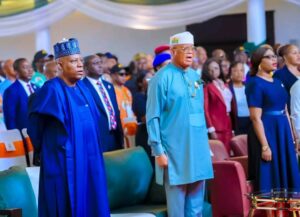
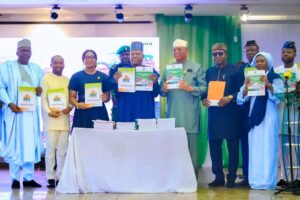
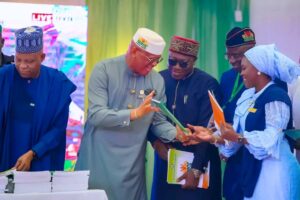
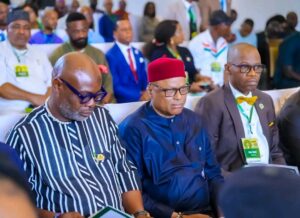
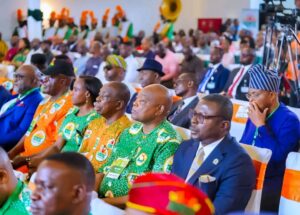
Politics
Wike hails 95% implementation of FCT 2024 budget, unveils key projects
Published
8 hours agoon
April 14, 2025By
Ekwutos Blog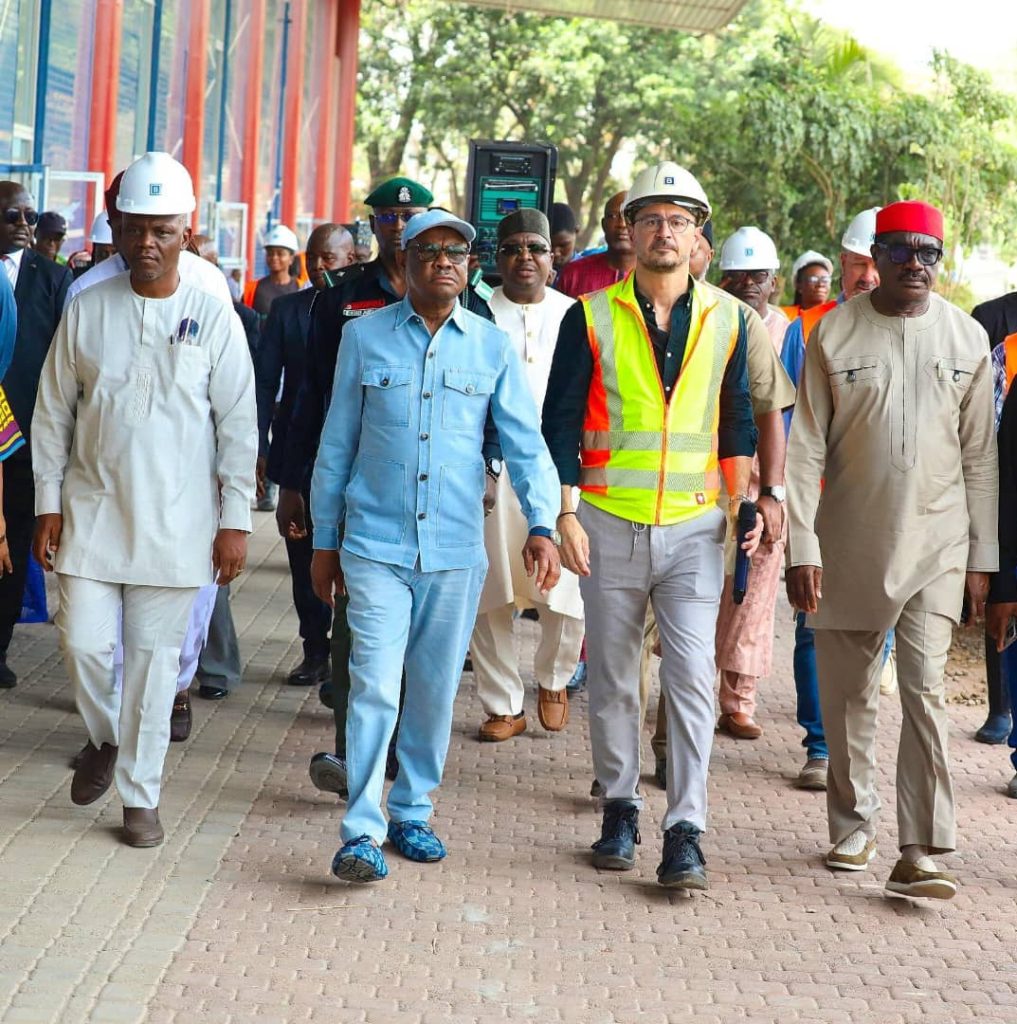
The Minister of the Federal Capital Territory (FCT), Barr. Ezenwo Nyesom Wike, has announced a landmark 95 percent implementation of the 2024 statutory budget, describing the achievement as unprecedented in the history of the FCT.
Wike made this known during a media briefing after inspecting several critical infrastructure projects across the Territory, including major roads at Life Camp and Katampe, as well as the ongoing renovation of the International Conference Centre, Abuja.
“I can tell you we’ve done not less than 95 percent of the budget implementation. That is historic. It has never happened before. And if you look at the projects there, you will see that there is no project that is in the 2024 budget that we have not touched,” he stated.
He attributed the progress to the National Assembly’s decision to extend the lifespan of the 2024 FCT statutory budget until June 2025, which he said enabled the Administration to sustain funding and accelerate delivery on major projects.
Wike also revealed that the 2025 statutory budget had already been submitted to the National Assembly and expressed hope that its timely passage would maintain the current momentum and support the completion of key infrastructure across the FCT.
During the tour, the Minister expressed satisfaction with the pace and quality of work, commending contractors for adhering to timelines and maintaining high standards.
Among the projects visited was the 4-kilometer six-lane dual carriageway linking Life Camp Junction to Ring Road III, currently under construction by Julius Berger. Once completed, the road will significantly improve connectivity between the districts of Kado, Karmo, Gwarimpa I, Dape, Ido-Gwari, Saburi, and Dei-Dei.
Another major project nearing completion is the access road from Nnamdi Azikiwe Expressway (by N16) to the Judges’ Quarters in Katampe District. This route will also connect the N20 (Wole Soyinka Way) in Jahi District with Katampe and Maitama, enhancing mobility in the area.
Wike expressed particular delight at the progress of the International Conference Centre renovation, which he described as rapidly advancing.
“These projects will be inaugurated by Mr. President during his second-year anniversary celebrations. We have gone to the International Conference Centre, which is almost ready. The first phase of the N5 will also be ready by the end of May,” he said.
Politics
Benue Govt moves to block Peter Obi’s visit amid Alia’s defection rumours
Published
8 hours agoon
April 14, 2025By
Ekwutos Blog
The Benue State Government is reportedly making moves to block a planned visit by Labour Party presidential candidate in the 2023 general election, Mr Peter Obi, to camps housing Internally Displaced Persons (IDPs) in the state.
Obi, whose post-election activities have prominently included humanitarian outreach to victims of violence across the country, was said to have planned a visit to some of the IDP camps in Benue.
The former Anambra State governor, in recent weeks, visited IDP camps in Plateau, Southern Kaduna and Nasarawa states, meeting with displaced families, donating relief materials and advocating for urgent government intervention.
His visit to Plateau State drew national attention after he held talks with Governor Caleb Mutfwang and visited victims of herdsmen attacks.
According to reliable sources, Obi’s team had reached out to the Benue State Emergency Management Agency (BSEMA) through its Executive Secretary, Sir James Iorpuu, to officially notify the agency and seek access to designated camps for the visit.
However, it appears the move has sparked a political storm within Benue’s corridors of power.
Top government officials reportedly advised Governor Alia against granting Obi access to the IDP camps, citing political undertones.
The visit, they argued, could be perceived as a calculated move by former Governor Samuel Ortom, a staunch supporter of Peter Obi during the 2023 presidential election, to revive his political relevance and embarrass the current administration.
Beyond the Ortom factor, sources also revealed that the decision to stop Obi’s visit was influenced by wider political calculations.
“It is believed that allowing Obi access at this time could fuel ongoing speculations that Governor Alia is considering leaving the All Progressives Congress (APC) amid tensions with some national leaders of the party.
“The governor is very conscious of his relationship with the Presidency and party hierarchy. Allowing Obi’s visit would not only trigger local political drama with Ortom but might also be interpreted in Abuja as a subtle alignment with the opposition at a time when Alia is battling internal party issues. This is not the kind of message he wants to send to the President.
“Such an association, especially with a high-profile opposition figure like Obi, could be politically damaging for Alia, who has been working to consolidate his hold on the state and maintain good standing with President Bola Tinubu’s administration,” a source told Ekwutosblog on Monday.
It would be recalled that in the February 25, 2023 presidential poll, Obi pulled a stunning performance in Benue State, securing over 308,000 votes, a figure that shocked many given the dominance traditionally enjoyed by the two major parties – APC and PDP.
His victory in the state was largely attributed to the support of Ortom and a groundswell of youth-driven, faith-based and middle-class backing.
Following this backdrop, sources disclosed that Governor Alia was convinced by his inner circle to forestall Obi’s visit to avoid reigniting political rivalries or offering Ortom and the Labour Party a platform to reassert influence in the state.
As a result, the governor reportedly instructed his Chief Press Secretary, Tersoo Kula, to issue a public statement cautioning against what it described as “unapproved high-profile visits” to the state.
“For anyone considering a visit to Benue State without the Governor’s knowledge, it is imperative to reconsider such plans, as the safety and security of individuals in this regard cannot be guaranteed,” he warned.
Though the statement fell short of directly naming Peter Obi, insiders confirmed that it was a veiled warning aimed at dissuading the former presidential candidate from proceeding with his proposed outreach.
One government source, speaking anonymously, said, “The governor is not comfortable with Obi’s visit, especially with the political undertones it carries.
“The camps are a sensitive issue and we cannot allow anyone to politicise the suffering of our displaced people.”
As of the time of filing this report, neither Obi’s camp nor the Labour Party has issued an official statement regarding the restriction.
However, a source close to the former governor disclosed that the visit was purely humanitarian and part of Obi’s ongoing national outreach to communities affected by violence and displacement.

NFF denies owing late Christian Chukwu amid social media claims

VP KASHIM SHETTIMA APPLAUDS GOV ENO’S INVESTMENT IN HUMAN CAPITAL DEVT.

GOV. OTU HAILS TINUBU AS CONSTRUCTION OF LAGOS-CALABAR COASTAL HIGHWAY BEGINS IN CROSS RIVER
Trending

 Trending6 months ago
Trending6 months agoNYA demands release of ‘abducted’ Imo chairman, preaches good governance
- Business6 months ago
US court acquits Air Peace boss, slams Mayfield $4000 fine

 Politics6 months ago
Politics6 months agoMexico’s new president causes concern just weeks before the US elections
- Entertainment6 months ago
Bobrisky transferred from Immigration to FCID, spends night behind bars
- Entertainment6 months ago
Bobrisky falls ill in police custody, rushed to hospital

 Politics6 months ago
Politics6 months agoRussia bans imports of agro-products from Kazakhstan after refusal to join BRICS

 Politics6 months ago
Politics6 months agoPutin invites 20 world leaders
- Politics1 year ago
Nigerian Senate passes Bill seeking the establishment of the South East Development Commission.

